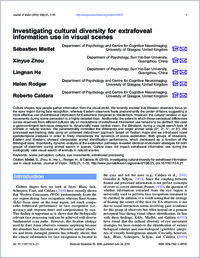Investigating cultural diversity for extrafoveal information use in visual scenes.
- Miellet, Sebastien Department of Psychology and Centre for Cognitive Neuroimaging, University of Glasgow,UK
- Zhou, Xinyue Department of Psychology, Sun Yat-Sen University, Guangzhou, China
- He, Lingnan Department of Psychology, Sun Yat-Sen University, Guangzhou, China
- Rodger, Helen Department of Psychology and Centre for Cognitive Neuroimaging, University of Glasgow, UK
- Caldara, Roberto Department of Psychology and Centre for Cognitive Neuroimaging, University of Glasgow, UK
-
2010
Published in:
- Journal of Vision. - 2010, vol. 10, no. 6, p. 21
English
Culture shapes how people gather information from the visual world. We recently showed that Western observers focus on the eyes region during face recognition, whereas Eastern observers fixate predominantly the center of faces, suggesting a more effective use of extrafoveal information for Easterners compared to Westerners. However, the cultural variation in eye movements during scene perception is a highly debated topic. Additionally, the extent to which those perceptual differences across observers from different cultures rely on modulations of extrafoveal information use remains to be clarified. We used a gaze-contingent technique designed to dynamically mask central vision, the Blindspot, during a visual search task of animals in natural scenes. We parametrically controlled the Blindspots and target animal sizes (0-, 2-, 5-, or 8-). We processed eye-tracking data using an unbiased data-driven approach based on fixation maps and we introduced novel spatiotemporal analyses in order to finely characterize the dynamics of scene exploration. Both groups of observers, Eastern and Western, showed comparable animal identification performance, which decreased as a function of the Blindspot sizes. Importantly, dynamic analysis of the exploration pathways revealed identical oculomotor strategies for both groups of observers during animal search in scenes. Culture does not impact extrafoveal information use during the ecologically valid visual search of animals in natural scenes.
- Faculty
- Faculté des lettres et des sciences humaines
- Department
- Département de Psychologie
- Language
-
- English
- Classification
- Psychology
- License
-
License undefined
- Identifiers
-
- RERO DOC 27176
- DOI 10.1167/10.6.21
- Persistent URL
- https://folia.unifr.ch/unifr/documents/301955
Statistics
Document views: 160
File downloads:
- Investigating cultural diversity for extrafoveal information use in visual scenes.: 238
